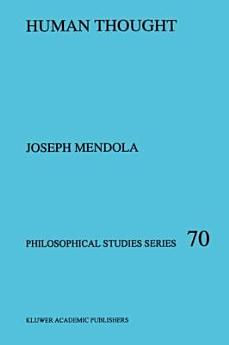Human Thought
J.R. Mendola
2012. g. dec. · Philosophical Studies Series 70. grāmata · Springer Science & Business Media
E-grāmata
481
Lappuses
reportAtsauksmes un vērtējumi nav pārbaudīti. Uzzināt vairāk
Par šo e-grāmatu
Conscious experience and thought content are customarily treated as distinct problems. This book argues that they are not. Part One develops a chastened empiricist theory of content, which cedes to experience a crucial role in rooting the contents of thoughts, but deploys an expanded conception of experience and of the ways in which contents may be rooted in experience. Part Two shows how, were the world as we experience it to be, our neurophysiology would be sufficient to constitute capacities for the range of intuitive thoughts recognized by Part One. Part Three argues that physics has shown that our experience is not veridical, and that this implies that no completely plausible account of how we have thoughts is comprehensible by humans. Yet this leaves thoughts not especially suspect, because such considerations also imply that all positive and contingent human conceptions of anything are false.
Novērtējiet šo e-grāmatu
Izsakiet savu viedokli!
Informācija lasīšanai
Viedtālruņi un planšetdatori
Instalējiet lietotni Google Play grāmatas Android ierīcēm un iPad planšetdatoriem/iPhone tālruņiem. Lietotne tiks automātiski sinhronizēta ar jūsu kontu un ļaus lasīt saturu tiešsaistē vai bezsaistē neatkarīgi no jūsu atrašanās vietas.
Klēpjdatori un galddatori
Varat klausīties pakalpojumā Google Play iegādātās audiogrāmatas, izmantojot datora tīmekļa pārlūkprogrammu.
E-lasītāji un citas ierīces
Lai lasītu grāmatas tādās elektroniskās tintes ierīcēs kā Kobo e-lasītāji, nepieciešams lejupielādēt failu un pārsūtīt to uz savu ierīci. Izpildiet palīdzības centrā sniegtos detalizētos norādījumus, lai pārsūtītu failus uz atbalstītiem e-lasītājiem.







